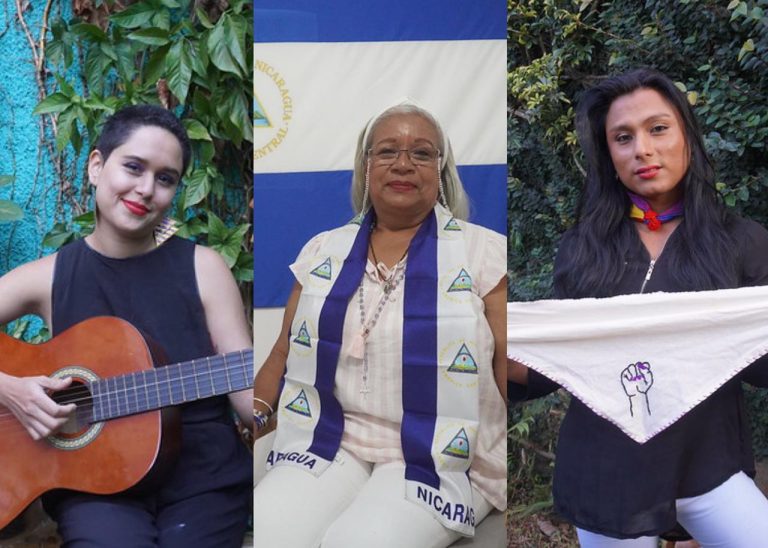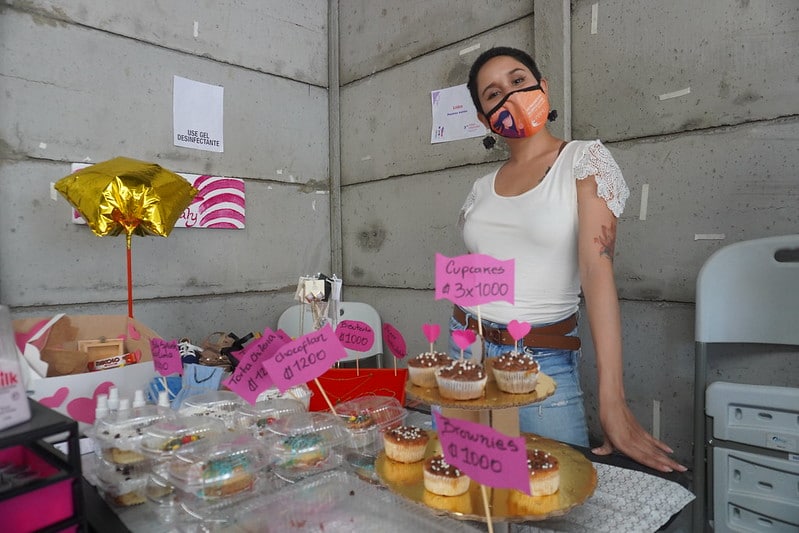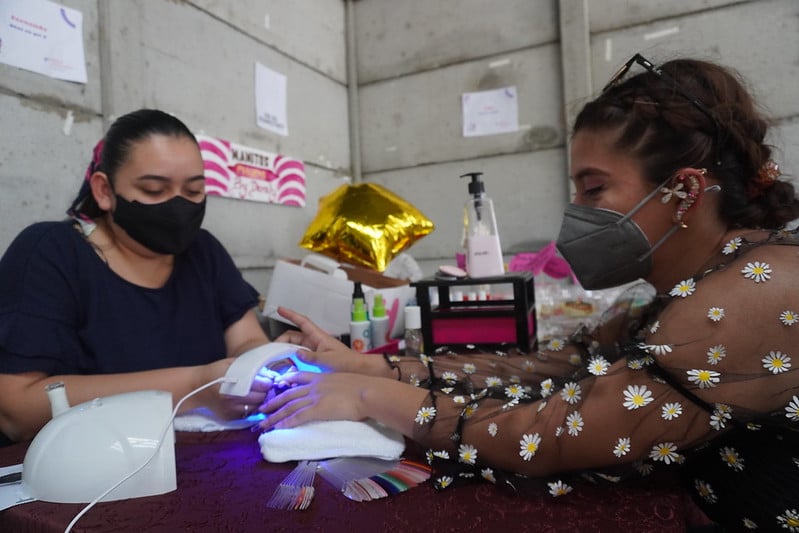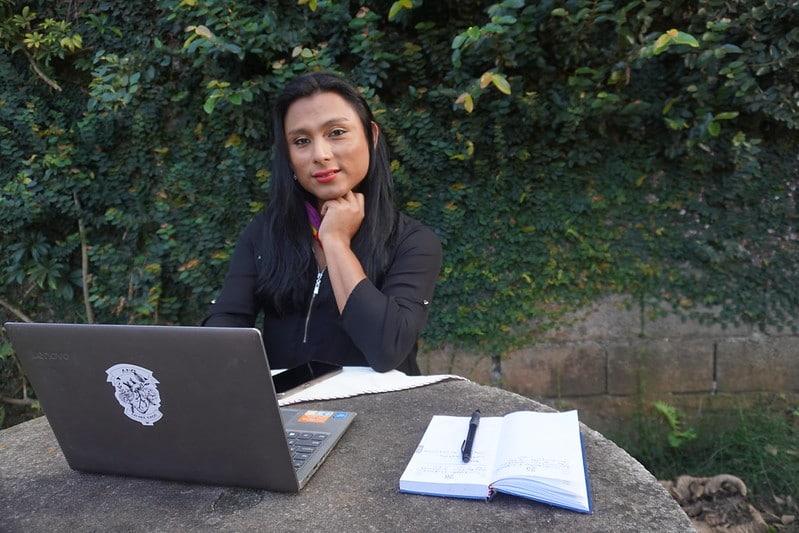30 de marzo 2021

European Concern over Lack of Academic Freedom in Nicaragua

PUBLICIDAD 1M
PUBLICIDAD 4D
PUBLICIDAD 5D
After almost three years of taking refuge, they continue with their lives, avoiding the lack of employment, discrimination and the pandemic

From left to right: Xaviera Molina, Ana Hernández and Yasuri Potoy, Nicaraguan women who had to flee their country persecuted after participating in the 2018 anti-government protests. Photos: Katherine Estrada
They were students, civil servants or private workers. They’re mothers, daughters, sisters, friends who fled Nicaragua to safeguard their own lives and that of their families. They crossed into Costa Rica through unmarked borders, with just a backpack.
They arrived with no passport and no money, thinking they’d soon be able to return home. They’re the women who were involved in the April 2018 Rebellion and had to flee the state repression.
“Faces of the Nicaraguan exiles in Costa Rica” is a study conducted by the Arias Foundation for Peace and Human Progress. The report states that 38% of those exiled in Costa Rica are women.
Nearly three years after leaving their country, the exiled Nicaraguan women have found ways to integrate and to gain skills. They’ve also find tools to survive amidst their limitations. Their strength lies in their resilience; they place their bets on surviving and resisting.
Confidencial interviewed three exiled Nicaraguan women about their lives in Costa Rica. They talked about how they’ve been coping with the forced displacement, and what expectations they have of returning to Nicaragua.

Xaviera en su stand de la feria que organiza junto a otras mujeres exiliadas. Foto: Katherine Estrada.
She lives surrounded by watercolors, brushes, and utensils for baking and decoration. She loves art and playing the guitar; she sings and makes pastries. She’s the mother of two little girls, one six years old, and the other eight months.
Xaviera arrived in Costa Rica in July 2018, following the government’s launch of “Operation Clean Up in Carazo department. She still dreams of returning to Nicaragua. “I still don’t feel like I’ve completely adapted to this county. I still feel the urge to be in mine. In the mornings, I feel the desire to be able to return home, to my town,” she tells us.
For Xaviera Molina, adjusting to the life of a refugee has been a difficult road, full of limitations. She feels undervalued in some areas, especially in the job market. The employment difficulties pushed her to start a dessert and craft business, to pay her basic expenses. She calls her business “Magic Hands by Doraly”.
When the COVID-19 pandemic began, Xaviera got together with other Nicaraguan women. They formed a collective to support each other and developed business plans to keep their endeavors afloat. That’s how the project Las Ferias Pinoleras [“Nica Markets”] was born. Women sell their products at this market in the Center of San Jose.

La feria en San José en que las mujeres nicaragüenses exiliadas venden sus productos. Foto: Katherine Estrada.
Xaviera speaks of her project with great excitement. “It’s worked super well for us. Not only for our own business initiatives, which is what we initially aimed at, but also to help more women. Little by little, it’s been growing. Now we’re looking for trainings to consolidate our relations. These have helped us raise the quality of our endeavors.”
In the market collective, Xaviera has also found spaces for healing. She’s been able to speak of the family violence she suffered. “They made me believe that I wasn’t capable, that I was alone, that I couldn’t get ahead. I was the victim of violence from my ex-partner, but I was also the victim of violence from the Nicaraguan government. There are many wounds that must heal. Between all of us, we support and inform each other,” she shares.
Xaviera’s two daughters go everywhere with her. Her older daughter likes painting, singing and pastry baking, following in the footsteps of her mother. “She loves decorating with me. She has a lot of fun with it, she sees it as a game… She also likes to make her own paintings and dedicate them. It’s her way of expressing herself and showing love.” Xaviera sees her daughters as her motivation to get ahead.
In Nicaragua, Xaviera studied Marketing and Advertising at the Carazo Regional Multi-Disciplinary Facility (FAREM). Like many other students now in exile, she was expelled from her career in reprisal for having participated in the protests. In Costa Rica, she’s been able to continue her development through organizations that have facilitated her professional and emotional growth.
Xaviera wants to own a larger business someday. She’s betting on a better future for her girls. Despite her exile, she remains focused on reaching the goals that were ripped away from her in her native country.

Ana’s not giving up her struggle to see her country freed so she can return home. Photo: Katherine Estrada
Ana Hernandez refers to herself as “the vandalic nurse”. The term refers mockingly to Vice President Rosario Murillo’s characterization of the protesters as “vandals”, among many other derogative expressions. Ana maintains her sense of humor, and her contagious laugh is infectious. She’s a very active woman, and highly involved with the community of women who’ve sought asylum in Costa Rica. She participates in marches, pickets, meeting, because she wants to see a change in her country.
In Nicaragua, she was working as a nurse in the city of Leon. She worked in Orthopedics and Trauma services at the “Dr. Oscar Danilo Rosales” Teaching Hospital. However, she was fired for participating in the massive anti-government marches that the students held in 2018.
During those 2018 protests, her image went viral on social media. They baptized her “The Vandalic Nurse”. She wears the nickname with pride, although it also made her the target of constant threats. These threats eventually forced her to flee the country.
She’d studied and worked in the nursing field for many years in Nicaragua. Unfortunately, it’s been very difficult for to find work in this field in Costa Rica. This is partly because of her age, and partly for different hurdles due to immigration. “I’m an older woman; I’m going to turn 60. I’ve gone to interviews where they’ve said: “One old woman coming to take care of another”.
Ana comments that some contracts for caring for elderly people also include housework or overtime hours at the same pay. Many job seekers end up agreeing to such conditions out of necessity.
The Social Research Institute of the University of Costa Rica, and the Culture and Development Investigation Center of the State Distance University carried out a joint study. It revealed that a sizeable number of Costa Rican immigrants work in caregiving and domestic labors.
That participation increased during the COVID-19 pandemic and is currently at the highest level registered in the last years.
The data demonstrates that there’s a stable and structural demand for immigrant labor in the field of domestic work. Nonetheless, the Costa Rican Ministry of Labor and Social Security has kept a tight lid on the field. In July 2020, the Ministry passed a Technical Recommendation that no new work permits should be issued for foreigners in this activity. Their justification was that they had to prioritize jobs for Costa Ricans who were currently unemployed.
Given this situation, many Nicaraguan immigrant women like Ana decided to launch their own initiatives. In the future, Ana wants to create a space where Nicaraguans can set up food businesses, selling tortillas, nacatamales or pinolillo.
Ana will soon be inaugurating “The Blue and White Women”, a community for exiles. There’ll be spaces for determining the women’s needs, and for creating strategies for their support and subsistence.
What Ana misses most in Nicaragua are her grandchildren. She longs to be able to return and hug them. Meanwhile, she continues her struggle unabated. She maintains her drive to move forward in the neighboring country, supporting the family she’s formed during her exile.

La joven exiliada quiere seguir aprendiendo en Costa Rica para mejorar su formación como activista social. Foto: Katherine Estrada.
This young activist works with the immigrant community in Costa Rica, especially with the LGBTQI community.
In 2018, Yasuri Potoy was in the last year of nursing school at Nicaragua’s National Autonomous University in Managua. When the protests broke out, she decided to join the medical brigades. These brigades were attending to those wounded during the Ortega regime’s violent repression.
Yasuri left for Costa Rica that same year. Like hundreds of other university students, she was being persecuted by the government for demonstrating against them. She admits it’s been a challenge to establish herself in the new country. “Being an asylum seeker involves stigmatization and discrimination. Being a trans woman puts you in on at an even higher level of vulnerability. There’s no opportunity to develop yourself,” she says.
In addition, “many women who emigrate are carrying a lot of wounds, a lot of unhealed grief.” In Yasuri’s case, she was able to find support from organizations that work with immigrants, especially immigrant women. Having this psycho-social accompaniment has been a great help, and has allowed her move forward.
She had a formal job as a poll-taker for a Costa Rican company. In general, though, she affirms that the panorama for trans women in Costa Rica is disheartening. Many don’t have a stable place to live. In addition, many have been victims of violence, human trafficking and assaults. Jobs are scarce. They even suffer limitations and discrimination in the health system.
The COVID-19 public health crisis has greatly increased the vulnerability of this immigrant population. According to the UN, the pandemic has increased the risk of people’s falling victim to human trafficking. Social inequality is on the rise, as well as unemployment, dropping income, and hunger. In addition, these immigrants feel the need to send money to their families, as well as accessing health care.
Yasuri currently has an internship at the Center for Immigrants’ Social Rights, in a project that accompanies migrants. This position allows her to aid the at-risk migrant communities.
“A lot of women have had to return to Nicaragua, despite the risk that they could be imprisoned,” Yasuri notes. “There was the case of Celia Cruz, a woman whose only crime was [to demand] freedom for our country. These situations pierce my heart … Listening to people who aspire to the presidency but fail to recognize our identity pushes me to continue in this long struggle.”
For now, she’s not thinking about returning to Nicaragua. “It’s a country with a lot of violence. Every day we hear news of girls, women, young people who’ve disappeared,” she observes.
Yasuri sees her stay in Costa Rica as an opportunity to grow as an activist, in order to return later. “To contribute to my country, help clear up myths. I want to strengthen the institutions, and work to advocate for the rights of LBGTQI people, especially trans women. We’re a reality. We need that democracy we’re planning to construct, to be inclusive, diverse and feminist.”
Archivado como:
PUBLICIDAD 3M
Periodista nicaragüense exiliada en Costa Rica. Se ha especializado en la cobertura de temas de migración, género y salud sexual y reproductiva. También ha trabajado en Marketing y Ventas y ha sido Ejecutiva de Cuentas.
PUBLICIDAD 3D